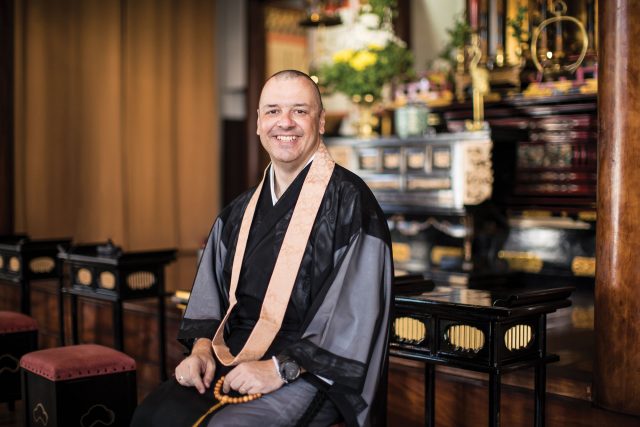City: São Paulo, Brazil
Tradition: Jodo Shinshu (Shinshu Otani Sect – Higashi Honganji)
Year Founded: 1952
Number of Members: 200
Meeting Place: Temple
Tricycle talks with Reverend Mauricio Hondaku, one of Higashi Honganji’s 36 ordained priests:
How did Higashi Honganji come to Brazil? The history of Buddhism here is mixed with the history of Asian immigration. Until 1888, slaves worked in the coffee and sugar cane plantations, and Brazil would trade these goods with Europe and the United States. After slavery was abolished, Brazil suffered a labor crisis, so at the beginning of the 20th century the Brazilian government established an agreement with Italy and Japan to bring paid workers to the plantations. The first ship, Kasato Maru, arrived 110 years ago, in 1908. Two railroads used to cross the São Paolo state: one went from east to west and another from north to south. A Japanese colony was established at each stop of that railroad, and many of the temples we have today are in those cities.
We know that Buddhism officially arrived when our mission here in Brazil was established with Higashi Honganji in the ’50s, but even before that, local lay people started to build temples and asked Japan to send ministers. In 1952 we established the central administration here at Jodoshu Betsuin, the main temple in São Paolo. Today we have 27 temples in Brazil, one in Argentina, and another in Paraguay, and we just established a dojo—not a temple but a group of practitioners—in Colombia.
Related: Buddhist Teachings for Fools and Losers
What services do you hold at the main temple in São Paolo? We hold many ancestor remembrance services, or hoji, and many people from the Japanese community come to our temple for these. Six years ago, we decided to try something that is successful in the United States, the Sunday service, and it became very, very popular. It’s rare to see a non-Japanese family attending the ancestral remembrance service, but at the Sunday service we see a mix of people. At the beginning, we thought that only Brazilians would attend. But we started to see people from the Japanese community too, because many of them now speak only Portuguese.

We have a special target for the Sunday service. For a long time, we kept hearing, “Okay, you guys are good. You teach the sutras. You teach the basics of Buddhism. But how can I apply it in my daily life?” So I decided to teach people how to do it. In the Sunday service, we chant the sutras in Portuguese—we translate a piece of the Amitabha Sutra and the Infinite Life Sutra. Then we take some news from the newspaper, something that happened around the world during the week, and we discuss it from the Buddhist perspective. We talk about real problems; we discuss real perspectives and real teachings.
For example, if there was a bombing in Paris, how, as Buddhists, can we think about what’s happening there afterward? Our goal is to help people think like Buddhists, and to get rid of the poisons of the mind and selfish opinions. Our goal is not to judge but rather to see the other side of a situation and to see the other side of people.
Are there specific teachings that are very important to your congregation? The Jodo Shinshu teaching is not based on external transformation—it’s different from other Buddhist schools. Shinran tried to transform himself, but it was only when he decided “I can’t—I’m not capable” and recognized himself as an ordinary, foolish guy that he could transform himself. I think this is the main message that resonates with the people here. We don’t want you to be the best person in the world, but please, recognize who you are. It’s OK. Everybody is bad sometimes. Not evil, but bad. If you keep saying, “Oh, I need to be good, I need to be good,” it’s like you are trying to change a cake without knowing the recipe. But if you dedicate yourself to understanding your recipe and how to build that cake, then you can improve the cake. I think this is the main teaching from Shinran—the 12th-century monk and our tradition’s founder—and from Buddha Shakyamuni that people especially hold in their hearts: Be yourself. But really be yourself. Don’t try to be somebody else.
—Marie Scarles, Associate Editor
Tricycle wants to learn about your sangha! Write news@tricycle.org to be considered.